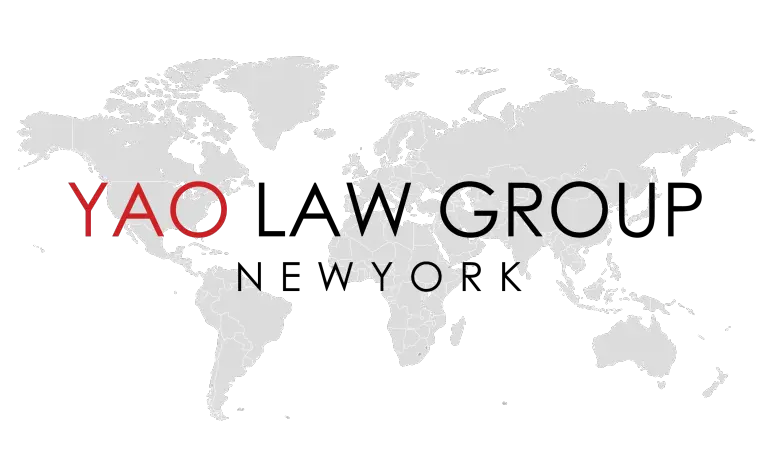Yao Law Group
Business Immigration Services
E-1 Visa Treaty Trader
To qualify for E-1 classification, the employee of a treaty trader must:
- Be the same nationality of the principal noncitizen employer (who must have the nationality of the treaty country)
- Meet the definition of “employee” under relevant law
- Either be engaging in duties of an executive or supervisory character, or if employed in a lesser capacity, have special qualifications that make the employee’s services essential to the efficient operation of the treaty enterprise.
If the principal noncitizen employer is not an individual, it must be an enterprise or organization at least 50% owned by persons in the United States who have the nationality of the treaty country. These owners must either: (a) be maintaining nonimmigrant treaty trader status or (b) if the owners are not in the United States, they must be, if they were to seek admission to this country, classifiable as nonimmigrant treaty traders. See 8 CFR 214.2(e)(3)(ii).
Duties which are of an executive or supervisory character are those that primarily provide the employee ultimate control and responsibility for the treaty enterprise’s overall operation, or a major component of it. See 8 CFR 214.2(e)(17) for a more complete definition.
Special qualifications are skills and/or aptitudes which make the employee’s services essential to the efficient operation of the treaty enterprise. There are several qualities or circumstances that could, depending on the facts, meet this requirement.
These include, but are not limited to:
- The degree of proven expertise in the employee’s area of operations
- Whether others possess the employee’s specific skills
- The salary that the special qualifications can command
- Whether the skills and qualifications are readily available in the United States
Knowledge of a foreign language and culture does not, by itself, meet this requirement. Note that in some cases a skill that is essential at one point in time may become commonplace, and therefore no longer qualifying, at a later date. See 8 CFR 214.2(e)(18) for a more complete definition.
Source: https://www.uscis.gov/working-in-the-united-states/temporary-workers/e-1-treaty-traders/
E-2 Visa: Treaty Investor
To qualify for E-2 classification, the treaty investor must:
- Be a national of a country with which the United States maintains a treaty of commerce and navigation;
- Have invested, or be actively in the process of investing, a substantial amount of capital in a bona fide enterprise in the United States; and
- Be seeking to enter the United States solely to develop and direct the investment enterprise. This is established by showing at least 50% ownership of the enterprise or possession of operational control through a managerial position or other corporate device.
Investment is the treaty investor’s placing of capital, including funds and/or other assets, at risk in the commercial sense with the objective of generating a profit. The capital must be subject to partial or total loss if the investment fails. The treaty investor must show that the funds have not been obtained, directly or indirectly, from criminal activity. See 8 CFR 214.2(e)(12) for more information.
A substantial amount of capital is:
- Substantial in relationship to the total cost of either purchasing an established enterprise or establishing a new one
- Sufficient to ensure the treaty investor’s financial commitment to the successful operation of the enterprise
- Of a magnitude to support the likelihood that the treaty investor will successfully develop and direct the enterprise. The lower the cost of the enterprise, the higher, proportionately, the investment must be to be considered substantial.
- A bona fide enterprise refers to a real, active, and operating commercial or entrepreneurial undertaking which produces services or goods for profit. It must meet applicable legal requirements for doing business within its jurisdiction.
Source: https://www.uscis.gov/working-in-the-united-states/temporary-workers/e-2-treaty-investors/

E-3: Specialty Occupation Workers from Australia
To qualify for an E-3 visa, you must demonstrate, among other things, that you:
- Are a national of Australia
- Have a legitimate offer of employment in the United States
- Possess the necessary academic or other qualifying credentials
- Will fill a position that qualifies as a specialty occupation
H-1B: Specialty Occupations
The occupation requires:
- Theoretical and practical application of a body of highly specialized knowledge; and
- Attainment of a bachelor’s or higher degree in the specific specialty (or its equivalent) as a minimum for entry into the occupation in the United States.
The position must also meet one of the following criteria to qualify as a specialty occupation:
- Bachelor’s or higher degree or its equivalent is normally the minimum entry requirement for the particular position
- The degree requirement is common to the industry in parallel positions among similar organizations or, in the alternative, the job is so complex or unique that it can be performed only by an individual with a degree
- The employer normally requires a degree or its equivalent for the position
- The nature of the specific duties is so specialized and complex that the knowledge required to perform the duties is usually associated with the attainment of a bachelor’s or higher degree.*
For you to qualify to perform services in a specialty occupation you must meet one of the following criteria:
- Hold a U.S. bachelor’s or higher degree required by the specialty occupation from an accredited college or university
- Hold a foreign degree that is the equivalent to a U.S. bachelor’s or higher degree required by the specialty occupation from an accredited college or university
- Hold an unrestricted state license, registration, or certification that authorizes you to fully practice the specialty occupation and be immediately engaged in that specialty in the state of intended employment
Have education, specialized training, and/or progressively responsible experience that is equivalent to the completion of a U.S. bachelor’s or higher degree in the specialty occupation, and have recognition of expertise in the specialty through progressively responsible positions directly related to the specialty.**
Source: https://www.uscis.gov/working-in-the-united-states/h-1b-specialty-occupations/
R-1 Nonimmigrant Religious Workers
An R-1 nonimmigrant is a noncitizen who is coming to the United States temporarily to work at least part time (an average of at least 20 hours per week) as a minister or in a religious vocation or occupation and be employed by a:
- Non-profit religious organization in the United States;
- Religious organization that is authorized by a group tax exemption holder to use its group tax exemption; or
- Non-profit organization which is affiliated with a religious denomination in the United States.
To qualify, you must have been a member of a religious denomination having a bona fide non-profit religious organization in the United States for at least two years immediately before filing the petition.
TN NAFTA Professionals
The North American Free Trade Agreement (NAFTA) created special economic and trade relationships for the United States, Canada and Mexico. The TN nonimmigrant classification permits qualified Canadian and Mexican citizens to seek temporary entry into the United States to engage in business activities at a professional level.
Among the types of professionals who are eligible to seek admission as TN nonimmigrants are accountants, engineers, lawyers, pharmacists, scientists, and teachers. You may be eligible for TN nonimmigrant status, if:
- You are a citizen of Canada or Mexico;
- Your profession qualifies under the regulations;
- The position in the United States requires a NAFTA professional;
- You have a prearranged full-time or part-time job with a U.S. employer (but not self-employment – see documentation required below); and
- You have the qualifications to practice in the profession in question.
Source: https://www.uscis.gov/working-in-the-united-states/temporary-workers/tn-nafta-professionals/
